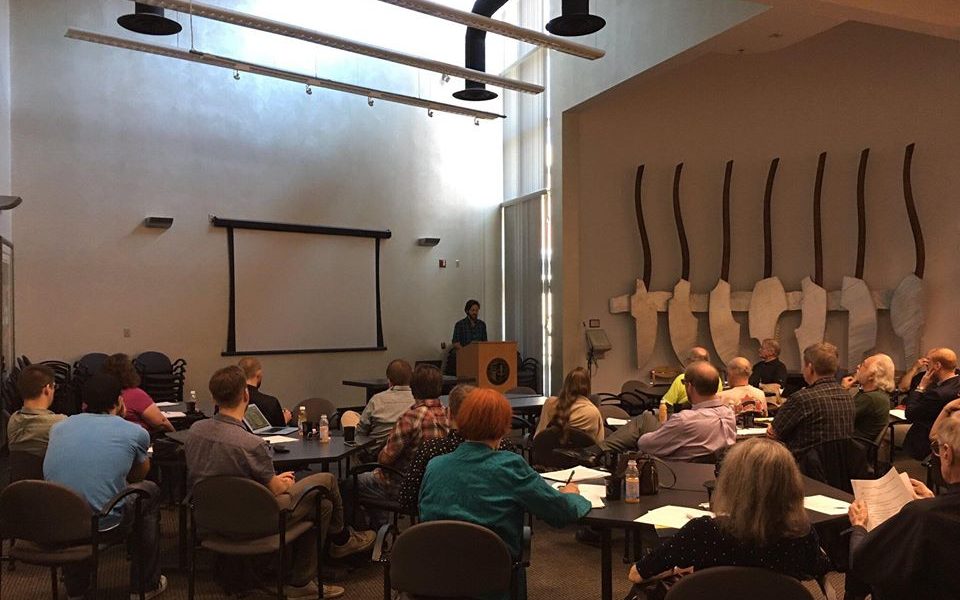By mid-February, though the 45th president had only been in the White House a few (eternal) weeks, his wretched arrival had long galvanized a reaction within the sports world. Spurred by athletes’ political response, two friends and I sent a panel proposal to the Sport Literature Association four months ahead of its annual conference.
Our theme: “#Resist: Sport Literature in Trump’s America.”
Angry, resolute and mobilized, the three of us — a PhD candidate, a professor and journalist — contended that our jobs, academic pursuits and positions of privilege should apply knowledge and experience to the task of resistance. At last week’s association conference in West Virginia, each of us argued that those involved in sport literature can and should speak to the political urgency of our troubling times.
And we weren’t the only ones. Many of the presentations echoed the fact that the world of sports now frequents the front page, much like other collisions of culture and politics.
This year marked the Sport Literature Association’s 34th annual conference. Dozens of professors, poets, graduate students, novelists and even others in my boat — defined, generously, as “independent scholars” — met at West Liberty University for four days of presentations.
The association is an international organization dedicated to the study of sport in literature and culture, bending the definitions of sport and literature along the way. (Fly fishing, bullfighting and ultra-running make almost annual appearances, and last year, somehow, they permitted me to present: “Sport as Freedom and Metaphor in Calvin and Hobbes, or: The Anarchy of Calvinball.”)
This time around, early on the morning of June 21, I began our panel — in fact, the whole conference — by discussing how the world of sports reflects the oppression and injustice that many face, as well as the connection and support that participants strive to find.
For almost six months I’ve served as sports columnist at Triad City Beat, striving to cover sports in a progressive way. Through the guidance and inspiration of brave athletes around the Triad, I’ve encountered three approaches for bringing important political issues to light.
The first method features the dynamic sports around us, ones that encourage individuals whose aspirations often don’t conform with the status quo. Think women’s football, for example. The next centers the progressive beliefs of athletes themselves, who are powerful voices in our society. Often their political ideas aren’t sought out or reported on, or they’re silenced by those not interested in stirring up contentious yet urgent debate. Finally, the lives of those who have been marginalized, specifically refugee and immigrant families, have reached a new depth of uncertainty and fear since Trump has taken office. Though their decades-long struggles have always been weighted with persecution, the need for respite and community — through sport or other means — has become stronger than ever.
Following my presentation, my co-panelist and Springfield College professor Kyle Belanger launched into his fascinating study on how the New England Patriots — infamously associated with Trump yet coupled with a handful of progressive African-American players — unintentionally volunteered as the nation’s fractured self-identity.
Then our colleague Matt Tettleton, a PhD candidate at the University of Colorado-Boulder, used Ralph Ellison’s novel Invisible Man to examine how the reaction to the protest of Colin Kaepernick — then the quarterback for the San Francisco 49ers — perpetuated racialized surveillance.
Overlapping political issues surround us in sports. Through presenting those intersections, academics, journalists, spectators and participants can use sports to encourage inclusion and challenge injustice. Sports can and do break down walls that divide us.
For my first-ever sports piece, I covered the Greensboro women’s arm-wrestling league and its event called Battle of the Stars, featuring dueling supporters of Star Trek and Star Wars.
“We need this,” one of the contestants said in an interview a couple of weeks after Trump’s inauguration. “It’s awesome, with everything going on, that we have these women. It feels good to have fun in light of everything.”
For those who might not have ever discovered and reveled in community through sport, they found camaraderie that night.
The following week, still less than a month after Inauguration Day, I wrote a piece about how sports and politics intersect in a time of racial tension — an article that featured the views of the co-chair of communications for Black Lives Matter Greensboro and her nephew’s basketball coach. The contention surrounding political stances in professional sports raises an important discussion about the position of influence held by athletes.
Earlier this month, I covered the Restaurant League at the Winston-Salem Sportsplex, late-night games for restaurant workers that transcend the uncertainty that limits their lives.
Encountering the sports world through a political lens has allowed some at the Sport Literature Association to support the causes that inevitably match their own resistance. For my part, I will endeavor to lift up the under-explored stories throughout the Triad that illuminate the struggle for change.
Join the First Amendment Society, a membership that goes directly to funding TCB‘s newsroom.
We believe that reporting can save the world.
The TCB First Amendment Society recognizes the vital role of a free, unfettered press with a bundling of local experiences designed to build community, and unique engagements with our newsroom that will help you understand, and shape, local journalism’s critical role in uplifting the people in our cities.
All revenue goes directly into the newsroom as reporters’ salaries and freelance commissions.


Leave a Reply